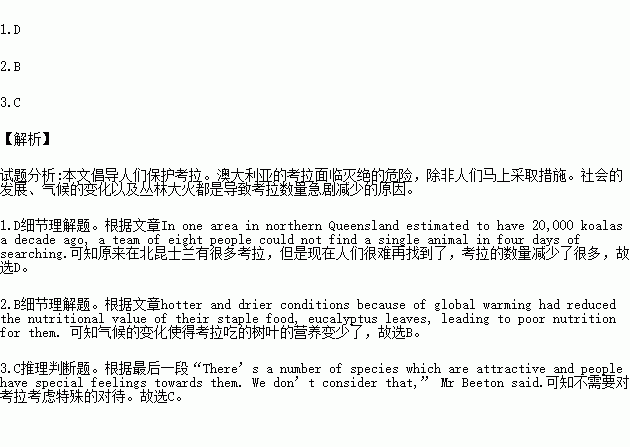题目内容
Australia’s koalas could die out within 30 years unless immediate action is taken to stop the losing in population, according to researchers. They say development, climate change and bushfires have all combined to reduce the number of wild koalas sharply.
The Australian Koala Foundation said a recent survey showed the population could have dropped by more than half in the past six years. The number of koalas was once estimated to be more than 100,000, but now is as few as 43,000.
The foundation collected field data from 1,800 sites and 80,000 trees to calculate the numbers. In one area in northern Queensland estimated to have 20,000 koalas a decade ago, a team of eight people could not find a single animal in four days of searching.
The foundation said besides problems caused by cutting down forests, hotter and drier conditions because of global warming had reduced the nutritional value of their main food, eucalyptus (桉树) leaves, leading to poor nutrition for them. Koalas, which live in the forests in Australia’s east and south, are very picky about what types of the leaves they eat.
Foundation chief Deborah Tabart said: “The koalas are missing everywhere we look. It’s really no tree, no me. If you keep cutting down trees you don’t have any koalas.”She is hoping the new figures will persuade the government’s Threatened Species Steering Committee (TSSC) to list the koala as threatened. But committee chairman Bob Beeton said a decision was not likely recently and the koala’s status as one of the country’s favorite animals would not be a factor. “There’s a number of species which are attractive and people have special feelings towards them. We don’t consider that,” Mr Beeton said.
1.The writer gives the example of the area in northern Queensland in Paragraph 3 to show that _____.
A. the forests are being damaged heavily
B. the environment is being polluted seriously
C. koalas usually live in wild mountainous areas
D. the number of koalas is dropping quickly
2.Global warming is an important cause of koalas’ reduction because _____.
A. koalas can hardly stand the hot weather
B. the leaves koalas eat are losing nutritional value
C. koalas cannot get enough water to drink
D. the leaves koalas eat cannot grow in hotter and drier weather
3.According to Bob Beeton, _____.
A. the koala is one of his favorite animals
B. a decision will be made to protect koalas in the future
C. they needn’t pay special attention to koalas
D. koalas needn’t be protected at all
 开心蛙口算题卡系列答案
开心蛙口算题卡系列答案
